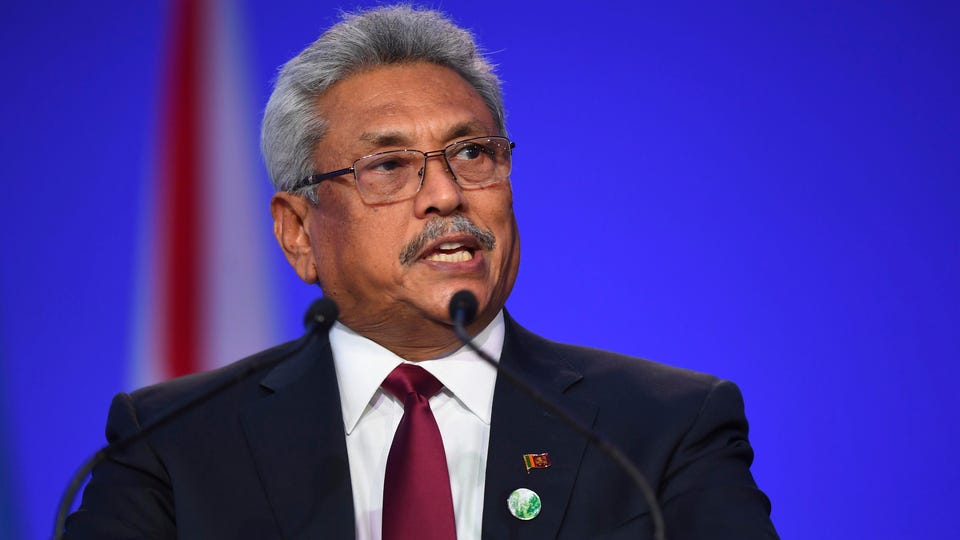Asia Sri Lanka’s Revolution Holds Lessons For Emerging Markets Vasuki Shastry Contributor Opinions expressed by Forbes Contributors are their own. I write about Asian economics and technology news. New! Follow this author to improve your content experience.
Got it! Jul 13, 2022, 04:50am EDT | Share to Facebook Share to Twitter Share to Linkedin Sri Lanka’s President Gotabaya Rajapaksa speaks during the opening ceremony of the UN Climate Change . . .
[+] Conference COP26 in Glasgow, Scotland on November 1, 2021. Andy Buchanan/Pool via AP A small country in South Asia with half the population of Ukraine has become embroiled in turmoil. People power protests over the past week have unseated Sri Lanka’s President Gotabaya Rajapaksa (who has fled the country in anticipation of resigning) and sent its Acting Prime Minister Ranil Wickremesinghe into hiding, while the country’s ruling class scrambles to fill the resulting political vacuum.
The proximate reason for the public anger are a combination of widespread food and fuel shortages, the crumbling of economic output, and a political implosion not seen in Asia since Indonesia’s own 1998 revolution. Yet international aid has not been forthcoming, possibly due to the G7’s predominant focus on Ukraine. Some analysts say that Sri Lanka’s woes are self-inflicted, which is largely true, and that they hold no broader lessons for emerging markets, which is completely false.
While the Rajapaksa clan are largely responsible for running the country into the ground, there are typologies in their (mis)behaviour, such as macroeconomic imbalances and public policy failures, which are relevant to developing Asia, and indeed for emerging markets. The first lesson is that political malfeasance on the scale witnessed in Sri Lanka is not unique to Asia. The pandemic demonstrated that democracies in developing Asia— India, the Philippines, Indonesia—were ill-prepared to deal with a public health crisis, showcasing serious governance deficits and shortfalls in technocratic competence.
In Sri Lanka, the malfeasance showed up in the Rajapaksa clan’s decision to ban fertilizer imports. In India and Indonesia, the state was poorly prepared to deal with the flow of migrants due to job losses from the pandemic. MORE FROM FORBES VETTED 21 Amazon Prime Day Robot Vacuum Deals That Are Already Live By Sholeen Damarwala Forbes Staff 36 Prime Day Competitor Sales With Way Better Deals Than Amazon By Ciannah Gin Forbes Staff An obvious consequence is that societies have become more combustible.
Sudden bursts of public anger over failures of the state, as we witnessed in Colombo last weekend, are no longer rare. When the Indian government announced a controversial scheme a few weeks ago to reconfigure Army recruitment, nation-wide protests broke out instantaneously. The mythology about the general public in Asia being pliant has also been demolished as protests in Hong Kong, Thailand and Myanmar (after the coup) have shown.
Auto rickshaw drivers line up to buy gas near a fuel station in Colombo, Sri Lanka on April 13, . . .
[+] 2022. (AP Photo/Eranga Jayawardena, File) AP Photo/Eranga Jayawardena, File Public anger is also linked with the struggle of central banks to deal with the first and second round effects of inflation. Globally, this has not been a shining moment for central banks, heroes of the global financial crisis and the first phase of the pandemic.
Their failure to anticipate inflationary shocks in 2021 (arising from supply chain dislocations and massive fiscal spending) and 2022 (mainly from the Russian invasion) has had a cascading impact on the economic fortunes of developed and emerging markets. While Asian central banks have fretted for the last year about the potential adverse impact from Fed tapering, they have been caught unawares by dollar strength and turmoil in commodity markets, which has pushed up import prices for food and fuel. The collateral damage for developing Asia, which accumulated official and corporate debt in foreign currencies during the go-go years of easy monetary policy, will be extremely painful.
This is already evident in another small nation—Laos—which is attempting to restructure its $14. 5 billion external debt obligation (much of it owed to China). Sri Lanka owes significantly more, around $54 billion, with much of it owed to private creditors.
This sum gets magnified when one considers that Asian corporates as a whole raised around $338 billion in dollar and euro-denominated debt last year. How much of this debt exposure is hedged to protect against a probable rise in the dollar, which has already taken place, is largely unknown. Sustained dollar strength and a continued deterioration in economic conditions are a toxic recipe for stress in Asian credit markets.
Credit events, a polite way of describing corporate defaults, are inevitable. A final reason for pessimism is the crumbling of global cooperation, already evident during the pandemic. While it is understandable for the IMF to take some time in negotiating an economic adjustment program with Sri Lanka, it was unconscionable for the international community to have remained on the sidelines while the country ran out of fuel and food.
A coordinated short-term plan to deliver emergency supplies to the country could have relieved pressures from the street and given the interim government some time to articulate an economic restoration plan. The fact that this did not happen illustrates the fracturing of global governance with the G7 consumed over Ukraine and the G20’s inability to reach consensus due to Russia’s participation in the group. The message from the implosion of Sri Lanka are two-fold.
First, countries are largely on their own in dealing with the domestic impacts from a rapidly slowing global economy. Second, things are about to get worse. Vasuki Shastry Editorial Standards Print Reprints & Permissions.
From: forbes
URL: https://www.forbes.com/sites/vasukishastry/2022/07/13/sri-lankas-revolution-holds-lessons-for-emerging-markets/



